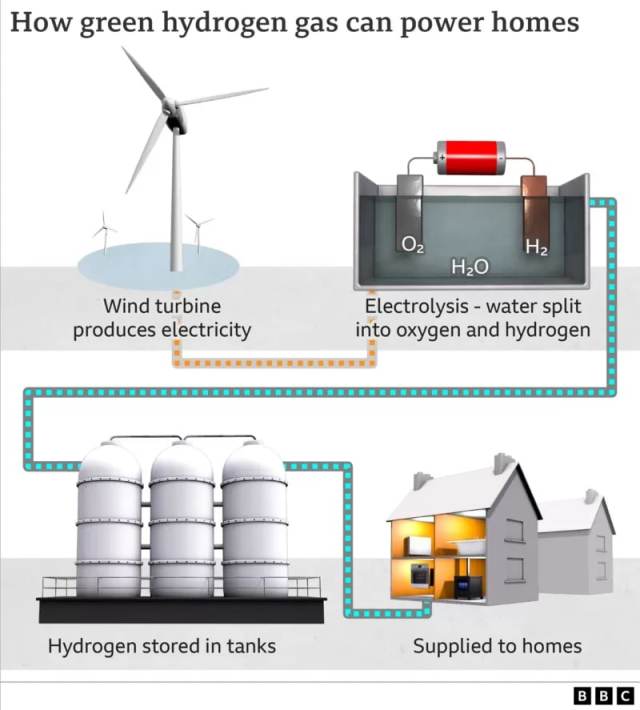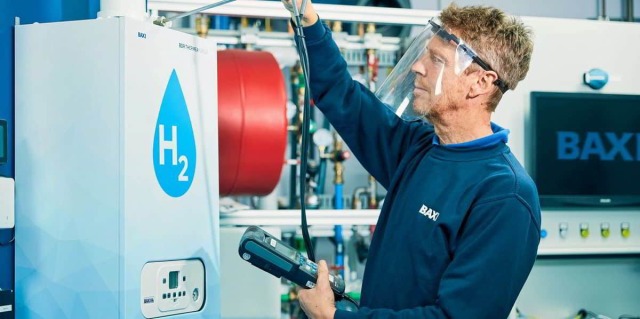Half of the total energy consumption by mankind is accounted for by heat, almost 50% of this amount is spent on heating and heating water in homes. For electricity — only 19%. From this it is clear that the issue of heating is even more important than the electric power industry, and without abandoning fossil fuels, a green transition is impossible here. However, as the new scientific work shows, hydrogen in this role is only an impossible dream.
The journal Joule has published a review of 32 scientific papers on the possibility of converting heating to hydrogen, which in a number of Western countries is considered a key component of the green transition. The study — for the first time in this field — did not include in its consideration works funded by certain companies financially interested in a massive transition to hydrogen. As a result, the author of the review, Jan Rosenow, came to quite interesting conclusions.
As he notes, almost every independent (in terms of sources of financing) work in this area indicates that hydrogen heating is more expensive not only than existing boiler houses, but also such seemingly more expensive ways to solve the heating problem as heat pumps (inverter air conditioners running on heating) and solar thermal heating (with it, the sun's rays heat the coolant on the roof of the houses, and that already heats the water of the heating circuit). This conclusion can hardly be called expected, since normally the last two methods of heating are a couple of times more expensive than boiler rooms.
The issue of heat generation is a key obstacle to the transition to a carbon neutral economy. It's not just that humanity spends two and a half times more energy on getting heat than it does on getting electricity. No less important is the fact that the need for heat in winter is many times higher than in summer, even taking into account the fact that industry, which consumes a little more than half of the heat, almost does not reduce its consumption in summer. As a result, the same Britain consumes four times more energy per unit of time in winter than in the warmer months.
It is difficult to solve this issue without burning fuel. In theory, it is possible to heat heat pumps powered by electricity. But in this case, winter electricity consumption will be two to three times higher than summer (in the case of a normal, not severe winter). The electric power industry, which operates at a third of its capacity in the summer, will be idle for a long time unclaimed, which will sharply increase the prices of electricity generated by it. Many would like to do without such consequences.

The scheme of using hydrogen. received from SES and WPP for heating houses has significant drawbacks that exclude its widespread use "For decision-makers, hydrogen for heating is seen as attractive.
It seems that it is easy to simply replace methane with hydrogen, which is why nothing will change for households. But in reality, significant technical changes will be required — including pipes in houses, and all this will cost people a lot of money," said Jan Roznau.
In addition, the author adds, today almost all hydrogen is obtained from fossil fuels, which makes it non-carbon neutral. Obtaining hydrogen from "green" electricity (from wind farms and SES) is still many times cheaper than from methane. The critical problem here remains low energy efficiency: electrolysis has an efficiency of only 80%, a typical gas boiler — 85%, which is why the final efficiency of hydrogen heating is not higher than 70%.
Heat pumps powered by electricity, although they lose 5-10% of energy to resistance in power lines, usually receive three to four kilowatt-hours of heat per kilowatt-hour of electricity (the difference is extinguished by absorbing heat from the outside winter air). That is, their total electricity costs — while the temperature is above zero — are three or more times lower than that of hydrogen heating.
Rosnau is not opposed to hydrogen in general. He notes that it can be useful for "decarbonizing" the industry. That consumes a little more heat than residential and commercial buildings, and mostly this heat is high-potential, with temperatures of many hundreds of degrees. No heat pumps can give this, and there is no alternative to green hydrogen here (at least within the framework of the approaches adopted in the West, in fact, of course, they exist, but they are not available for Western countries today). But in the household sector, he emphasizes, this gas will not only increase their costs, but also force them to increase the waste of natural resources, raising the overall energy consumption.
Although Roznau correctly stated a number of hydrogen problems (coincidentally coinciding with part of the theses ru/article/nakedscience/chem-sogreyut-bezugrodnyj-mir-vodorod-protiv-atoma?utm_source=inarticle&utm_medium=inarticle&utm_campaign=inarticle " target="_blank" rel="nofollow">of this Naked Science material), he did not stop at the disadvantages of heat pumps that make and their success as a substitute for natural gas is rather doubtful. The fact is that at minus five degrees and below one kilowatt-hour of electricity, the heat pump gives about one kilowatt-hour of thermal energy: it becomes quite difficult to cool the outdoor air to heat the room at this temperature.
Therefore, in practice, the peak winter energy consumption in a country that has completely switched to heat pumps will be four to five times higher on the most frosty winter days than in summer. That is, such heating will have to rely on the huge capacity of power plants — many times more than existing ones — which will be idle almost all year, turning on only on the frostiest days. Obviously, the cost of such a solution for society will be great. Therefore, earlier other authors have repeatedly noted: the transition to heat pumps will also dramatically increase the cost of heating.
Meanwhile, the price of heating is already quite a sore spot for a number of modern societies. For example, in the UK, even before the price shock of 2022, 60.5 thousand people a year die as a result of cold weather, approximately 0.1% of the total population annually. It has been reliably established that in a room where the heating is worse, the average blood pressure in a person increases . Moreover, it is more related to the winter temperature indoors than outdoors.
As a result of a systematic increase in such pressure, the probability of death from cardiovascular diseases increases, which are the main factor in cold mortality. A multiple increase in the cost of heating will inevitably lead to a decrease in temperatures in the homes of residents of Western countries with all the consequences that follow from this.

